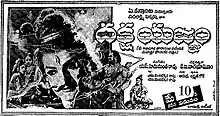Dakshayagnam (1962 film)
Dakshayagnam is a 1962 Indian Telugu-language Hindu mythological film, produced and directed by Kadaru Nagabhushanam under the Varalakshmi Pictures banner. It stars N. T. Rama Rao, Devika, S. V. Ranga Rao[1] with music composed by Saluri Hanumantha Rao. This was N. T. Rama Rao's 100th film which was also dubbed in Tamil with the same title.
| Dakshayagnam | |
|---|---|
 Theatrical release poster | |
| Telugu | దక్షయజ్ఞం |
| Directed by | Kadaru Nagabhushanam |
| Written by | Aarudhra (dialogues) |
| Produced by | Kadaru Nagabhushanam Kannamba (Presents) |
| Starring | N. T. Rama Rao Devika S. V. Ranga Rao |
| Cinematography | Lakshman Ghore |
| Edited by | N. K. Gopal |
| Music by | Saluri Hanumantha Rao |
Production company | Varalakshmi Pictures |
Release date |
|
Running time | 157 minutes |
| Country | India |
| Language | Telugu |
Plot
The film begins with Daksha crowning as the king of the Prajapatis, all the deities bestow him the most effective powers and a boon that no one will cross his words. After that, he is blessed with 2 sons and adopts 27 girls. Soon after, Adi Parashakthi was born as his daughter Sati advert devotee of Shiva who endears him as a spouse. Daksha performs his 27 daughters' nuptials with Chandra. Anyhow, he spends most of his time with Rohini and ignores the others. Being cognizant of it enraged Daksha curses Chandra to die out of T.B. Here Chandra prays to Siva who words to guard him. Thus, war erupts between Daksha & Siva which pacifies by Vishnu by diving Chandra into two. However, Daksha maintains his grudge against Siva. During this, he is aware of Sati’s love affair, so, he seeks her alliance but Sati splices Siva against her father's wish. Infuriated, Daksha decides to disgrace Siva by failing to give a share to him in a sacrifice. Sati uninvitedly visits the function ignoring the advice of her husband where she is mortified by Daksha. As a result, she immolated herself in the sacrificial fire. Hearing it, Siva makes a ferocious dance Rudra Thandava and wakes up Veerabhadra from his hair, who destroys the sacrifice and decapitates Daksha. At last, on prayers of Daksha's wife Vairini Siva forgives Daksha and brings him back to life-giving him a goat's head instead of his own. Finally, the place where Siva blessed Daksha is adored as Draksharama near Rajamandry till today.
Cast
- N. T. Rama Rao as Shiva
- Devika as Sati Devi
- S. V. Ranga Rao as Daksha
- Kannamba as Vairini
- V. Nagayya as Dadhichi Maharshi
- Rajanala as Indra
- Ramakrishna as Chandra
- Mikkilineni as Lord Brahma
- Padmanabham as Daksha's Younger son
- Suri Babu as Nandi
- Raghuramaiah as Narada Maharshi
- Balakrishna as Daksha's Elder son
- Dr. Sivaramakrishnaiah
- Rajasree as Rohini
- Chayadevi
- Meena Kumari
- Vasanthi
- Ambika Sukumaran as Urvashi
Soundtrack
Music composed by Saluri Hanumantha Rao. Lyrics were written by Aarudhra.[2]
| S.No | Song Title | Singers | length |
|---|---|---|---|
| 1 | Namo Namo Nadaraja | Madhavapeddi Satyam | 4:50 |
| 2 | Jabilli Ohoho Jabilli | P. B. Srinivas, K. Jamuna Rani | 3:08 |
| 3 | Hara Hara Mahadeva | P. Suri Babu | 4:06 |
| 4 | Koyila Thelupavate | P. Susheela | 3:38 |
| 5 | Idhi Chakkani Lokam | P. B. Srinivas, S. Janaki | 3:33 |
| 6 | Nee Pada Samseva | P. Leela | 3:02 |
| 7 | Kaanaru Nee Mahima | Raghuramaiah | 2:56 |
| 8 | Emi Seyudu Devadeva | P. Leela | 3:20 |
| 9 | Karunaamoorthulu | Raghuramaiah | 1:34 |
| 10 | Navarasa Bhavala | P. Leela, Radha Jayalakshmi | 5:33 |
| 11 | Pasuvaa | Madhavapeddi Satyam | 1:00 |
| 12 | Kamaneeyam Kailasam | P. Susheela | 2:56 |
| 13 | Girija Kalyanam | P. Suribabu, Madhavapeddi Satyam, Raghuramaiah, P. Susheela | 13:15 |
| 14 | Mangalam Mahaniya Teja | M. Mallikarjuna Rao Bhagavathar | 0:22 |
References
- Radhakrishna (18 May 1962). "చిత్రసమీక్ష: దక్షయజ్ఞం" [Film Review: Dakshayagnam] (PDF). Andhra Prabha (in Telugu). Vijayawada. p. 6. Archived from the original on 14 November 2020. Retrieved 22 July 2022.
- "Daksha Yagnyam (1962)-Song_Booklet". Indiancine.ma. Retrieved 23 January 2021.